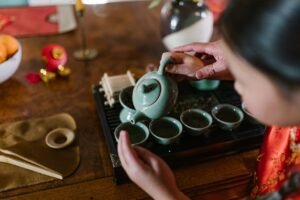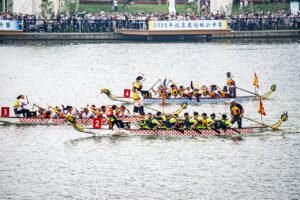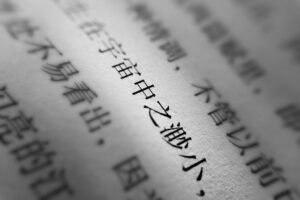Welcome to our in-depth exploration of the cultural components of the HSK Exam! While the HSK Exam is primarily designed to assess your Chinese language proficiency, it also incorporates various cultural aspects that go beyond mere language skills. Understanding these cultural components is not only essential for performing well in the exam but also for truly immersing yourself in the rich tapestry of Chinese language and culture.
In this section, we will take a closer look at these cultural components and the value they bring to your journey to learn Chinese. By gaining insights into Chinese culture, you can enhance your language mastery and develop a deeper appreciation for the language’s nuances.
Table of Contents
ToggleKey Takeaways:
- Exploring cultural components is crucial for a comprehensive understanding of the HSK Exam.
- Cultural competence plays a vital role in language learning and preparation for the HSK Exam.
- Cultural themes, festivals, traditions, and historical figures are commonly tested in the HSK Exam.
- Understanding Chinese cultural etiquette and social norms is essential for effective communication.
- Engaging with the cultural components of the HSK Exam allows for a well-rounded language learning experience.
The Importance of Cultural Competence in Language Learning
When it comes to language learning, cultural competence plays a significant role in the journey of acquiring proficiency. This is particularly true for those preparing for the HSK Exam, a standardized test that assesses Chinese language proficiency. In this section, we will explore the importance of cultural competence in language learning and how it can enhance your overall language proficiency, specifically in the context of preparing for the HSK Exam.
Language learning is not just about memorizing vocabulary and grammar rules; it is also about understanding the cultural nuances that shape language usage. Cultural competence allows learners to navigate various social and cultural contexts with ease, promoting effective communication and building deeper connections with native speakers. By gaining a deeper understanding of Chinese culture, learners can develop a more authentic and nuanced command of the language.
So, why is cultural competence particularly important for HSK Exam preparation? The HSK Exam assesses not only language proficiency but also the understanding of Chinese culture and society. To excel in this exam, one must demonstrate an ability to comprehend and navigate cultural themes and contexts effectively. By immersing yourself in Chinese culture, you will gain valuable insights that go beyond language proficiency, enabling you to excel in the HSK Exam and real-life interactions with Chinese speakers.
Benefits of Cultural Competence in Language Learning
Developing cultural competence in language learning offers numerous benefits, regardless of the specific exam or proficiency assessment. Let’s explore some of these benefits:
- Enhanced Communication Skills: Cultural competence enables learners to understand cultural references, idiomatic expressions, and nonverbal cues that are essential for effective communication.
- Deeper Appreciation for the Language: By immersing yourself in Chinese culture, you will gain a deeper appreciation for the language’s rich history, traditions, and societal norms.
- Increased Confidence: Cultural competence helps learners feel more confident and at ease in social interactions, as they understand and respect the cultural norms and etiquette of the target language.
- Greater Cultural Awareness: Language and culture are inherently interconnected. Cultural competence fosters a greater understanding of diverse cultures and promotes empathy and respect for others.
By embracing cultural competence in your language learning journey, you will not only become proficient in the Chinese language but also develop a broader perspective of the world and the people who inhabit it. Now, let’s dive deeper into the cultural themes commonly found in the HSK Exam.
Cultural Themes in the HSK Exam
When preparing for the HSK Exam, it is essential to explore the cultural themes that are commonly found in the test. These cultural themes go beyond language proficiency and provide a deeper understanding of Chinese culture. By familiarizing yourself with these themes, you not only improve your language skills but also gain a greater appreciation for the rich cultural heritage of China.
Traditional Customs
One of the cultural themes that frequently appears in the HSK Exam is traditional customs. This includes traditional Chinese rituals, ceremonies, and practices that have been passed down through generations. By studying and understanding these customs, you gain insight into the values, beliefs, and traditions that shape Chinese society.
Festivals
Festivals play a significant role in Chinese culture, and it’s no surprise that they are often tested in the HSK Exam. Festivals such as Chinese New Year, Mid-Autumn Festival, and Dragon Boat Festival are rich in cultural symbolism and provide a glimpse into Chinese traditions and customs.
Etiquette
Etiquette is an integral part of any culture, and China is no exception. Recognizing the importance of cultural etiquette is essential to navigating social situations in China. The HSK Exam often includes questions on Chinese etiquette, such as proper greetings, gift-giving customs, and dining etiquette.
History
China has a vast and fascinating history that has shaped its culture and society. Understanding key historical events, dynasties, and figures is crucial to comprehending the cultural context of the Chinese language. The HSK Exam may test your knowledge of significant historical periods, rulers, and their impact on Chinese society.
Famous Chinese Individuals
The HSK Exam often assesses your knowledge of famous Chinese individuals who have influenced Chinese culture and society. From ancient philosophers like Confucius to modern-day celebrities, knowing about these individuals provides valuable cultural and historical insights.
| Cultural Themes | Examples |
|---|---|
| Traditional Customs | Chinese tea ceremonies Lunar New Year traditions |
| Festivals | Mid-Autumn Festival Dragon Boat Festival |
| Etiquette | Proper greetings Dining etiquette |
| History | Ming Dynasty Cultural Revolution |
| Famous Chinese Individuals | Confucius Mao Zedong |
By embracing and understanding these cultural themes, you can enhance your language learning journey and develop a deeper connection with the Chinese language and culture. Embrace the richness of Chinese culture as you prepare for the HSK Exam, and open yourself to a world of knowledge and appreciation.
Exploring Chinese festivals and Traditions
In this section, we will embark on a fascinating journey to delve into some of the most celebrated Chinese festivals and traditions. These vibrant cultural events are not only an integral part of the HSK Exam but also offer valuable insights into Chinese culture.
Chinese New Year
Chinese New Year, also known as the Spring Festival, is the most important traditional festival in China. It marks the beginning of the lunar new year and is celebrated with vibrant parades, dragon dances, firecrackers, and family gatherings. This festival is a time for family reunions and symbolizes good luck and prosperity for the coming year.
Mid-Autumn Festival
The Mid-Autumn Festival, also known as the Moon Festival, is a time to celebrate the harvest and give thanks for abundance. Families gather to admire the full moon, indulge in mooncakes, and enjoy time together. Lanterns are lit, creating a beautiful spectacle that illuminates the night sky.
Dragon Boat Festival
The Dragon Boat Festival, also known as Duanwu, commemorates Qu Yuan, a beloved poet and statesman of ancient China. This festival is known for its exhilarating dragon boat races, in which teams paddle vigorously to the beat of drums. It is also a time to enjoy sticky rice dumplings and hang colorful pouches of herbs to ward off evil spirits.
By understanding the significance of these festivals and traditions, you not only gain cultural knowledge but also enhance your language learning experience. Immersing yourself in the festival spirit will enable you to engage in meaningful conversations with native Chinese speakers, fostering a deeper connection to the language and its rich cultural heritage.
Cultural Etiquette and Social Norms in China
When interacting with Chinese people, it is essential to be aware of the cultural etiquette and social norms that shape their society. Understanding these norms not only helps you navigate social encounters with grace and respect but also plays a significant role in your performance in the HSK Exam.
Chinese culture places a strong emphasis on hierarchy, respect for authority, and maintaining harmonious relationships. Adhering to these cultural values can greatly contribute to your overall success, both in the exam and in real-life situations.
Key Cultural Etiquette and Social Norms in China
- Hierarchy and Respect: Chinese culture values hierarchical relationships, giving utmost respect to elders, leaders, and senior individuals. It is essential to address people using appropriate titles and honorifics.
- Face Saving: Face-saving is a crucial aspect of Chinese culture, wherein individuals avoid causing embarrassment or loss of face for themselves or others. It is important to communicate and offer feedback in a considerate and tactful manner.
- Gift Giving: Gift giving is a common practice in Chinese culture, symbolizing respect, gratitude, and goodwill. When presenting gifts, it is customary to wrap them in red or gold paper and avoid gifts with negative connotations.
- Dining Etiquette: Dining etiquette holds special significance in Chinese culture. It is customary to wait for the host to start eating before you begin, and to use chopsticks and serving utensils correctly. Expressing appreciation for the food and the host’s generosity is also essential.
- Nonverbal Communication: Nonverbal cues, such as maintaining eye contact, nodding, and keeping a respectful distance, play a significant role in Chinese communication. Being mindful of your body language and gestures can help you convey respect and understanding.
By familiarizing yourself with these cultural etiquette and social norms, you can navigate social interactions in China with confidence and respect. Not only will this enhance your overall language learning experience, but it will also deepen your understanding of Chinese culture and society as a whole, which is essential for success in the HSK Exam.
Historical and Cultural Figures in Chinese Society
China’s rich history and culture are shaped by a multitude of remarkable historical and cultural figures who have made significant contributions to the nation’s development. By familiarizing yourself with these influential individuals, you can gain a deeper understanding of Chinese society, making your journey to learn Chinese even more enriching.
Ancient Philosophers
China boasts of several renowned ancient philosophers who have had a profound impact on Chinese culture and society. One such figure is Confucius, considered the father of Confucianism, a moral and ethical philosophy that profoundly shaped Chinese civilization. Confucius emphasized the importance of moral behavior, respect for authority, and the cultivation of virtue.
“Our greatest glory is not in never falling, but in rising every time we fall.” – Confucius
Another influential philosopher is Laozi, the founder of Daoism, which focuses on living in harmony with nature and embracing simplicity. Laozi’s teachings emphasize the concept of “wuwei,” or non-action, and the cultivation of innate wisdom.
Influential Emperors
Chinese history is also marked by several influential emperors who left indelible imprints on the nation. Emperor Qin Shi Huang, the first emperor of China, played a pivotal role in unifying the country and constructing the Great Wall of China. His reign set the stage for the subsequent dynasties and shaped China’s political landscape.
Revolutionary Figures
- Sun Yat-sen: A prominent figure in China’s Republican Revolution, Sun Yat-sen is often referred to as the “Father of Modern China.” He advocated for the overthrow of the Qing Dynasty and played a key role in establishing the Republic of China.
- Mao Zedong: As the founding father of the People’s Republic of China, Mao Zedong led the Communist Party of China to victory in the Chinese Civil War. He implemented sweeping social and economic reforms, leaving a lasting impact on Chinese society.
These are just a few examples of the historical and cultural figures in Chinese society. By exploring the lives and legacies of these individuals, you can deepen your appreciation for Chinese history and gain valuable insights into the nation’s cultural heritage.
| Figure | Contribution |
|---|---|
| Confucius | Founded Confucianism and emphasized moral behavior and respect for authority. |
| Laozi | Founder of Daoism, focused on living in harmony with nature and simplicity. |
| Emperor Qin Shi Huang | Unified China and constructed the Great Wall of China. |
| Sun Yat-sen | Played a crucial role in the Republican Revolution and establishing the Republic of China. |
| Mao Zedong | Founding father of the People’s Republic of China and implemented sweeping social and economic reforms. |
Conclusion
In conclusion, the cultural components of the HSK Exam provide a fascinating window into the world of Chinese language and culture. It goes beyond mere language proficiency, offering learners the opportunity to gain a deeper understanding of Chinese traditions, etiquette, and historical figures.
By immersing yourself in the cultural aspects tested in the exam, you not only enhance your language skills but also develop a greater appreciation for Chinese society. Embracing these cultural components on your journey to learn Chinese will transform you into a well-rounded and culturally sensitive language learner.
So, as you prepare for the HSK Exam, remember to explore the cultural themes, engage with Chinese festivals and traditions, familiarize yourself with cultural etiquette and social norms, and learn about significant historical and cultural figures. These valuable insights will not only enrich your language learning experience but also establish a strong foundation for future interactions with native Chinese speakers.
FAQ
What are the cultural components of the HSK Exam?
The cultural components of the HSK Exam encompass various aspects of Chinese culture, including traditional customs, festivals, etiquette, history, and famous Chinese individuals.
Why is cultural competence important in language learning, specifically for the HSK Exam?
Cultural competence is crucial in language learning, especially when preparing for the HSK Exam. Understanding Chinese culture enhances your overall language proficiency and helps you navigate different social and cultural contexts seamlessly.
What are some common cultural themes in the HSK Exam?
The HSK Exam often tests cultural themes such as traditional customs, festivals, etiquette, history, and famous Chinese individuals.
Which Chinese festivals and traditions are important to know for the HSK Exam?
Some key Chinese festivals and traditions tested in the HSK Exam include Chinese New Year, Mid-Autumn Festival, and Dragon Boat Festival. Understanding their significance allows for meaningful conversations with native Chinese speakers.
What cultural etiquette and social norms should I be aware of in China for the HSK Exam?
It is essential to familiarize yourself with Chinese cultural etiquette and social norms when interacting with Chinese people. This knowledge will help you navigate social encounters with grace and respect, not only during the HSK Exam but also in real-life situations.
Who are some significant historical and cultural figures in Chinese society to study for the HSK Exam?
The HSK Exam often includes questions about remarkable historical and cultural figures in Chinese society, such as Confucius, Mao Zedong, and other influential individuals. Understanding their impact on Chinese culture and society enhances your overall understanding of Chinese history.
Contact our head teacher, Chen Huimin, at info@lcchineseschool.com if you want to learn Chinese or have additional questions about our Chinese programs.
Sign up for a free trial class here.
Learn about our Internship Program in China.
Get free Chinese learning resources.
Learn about China’s 2024 Offical Holiday Schedule








